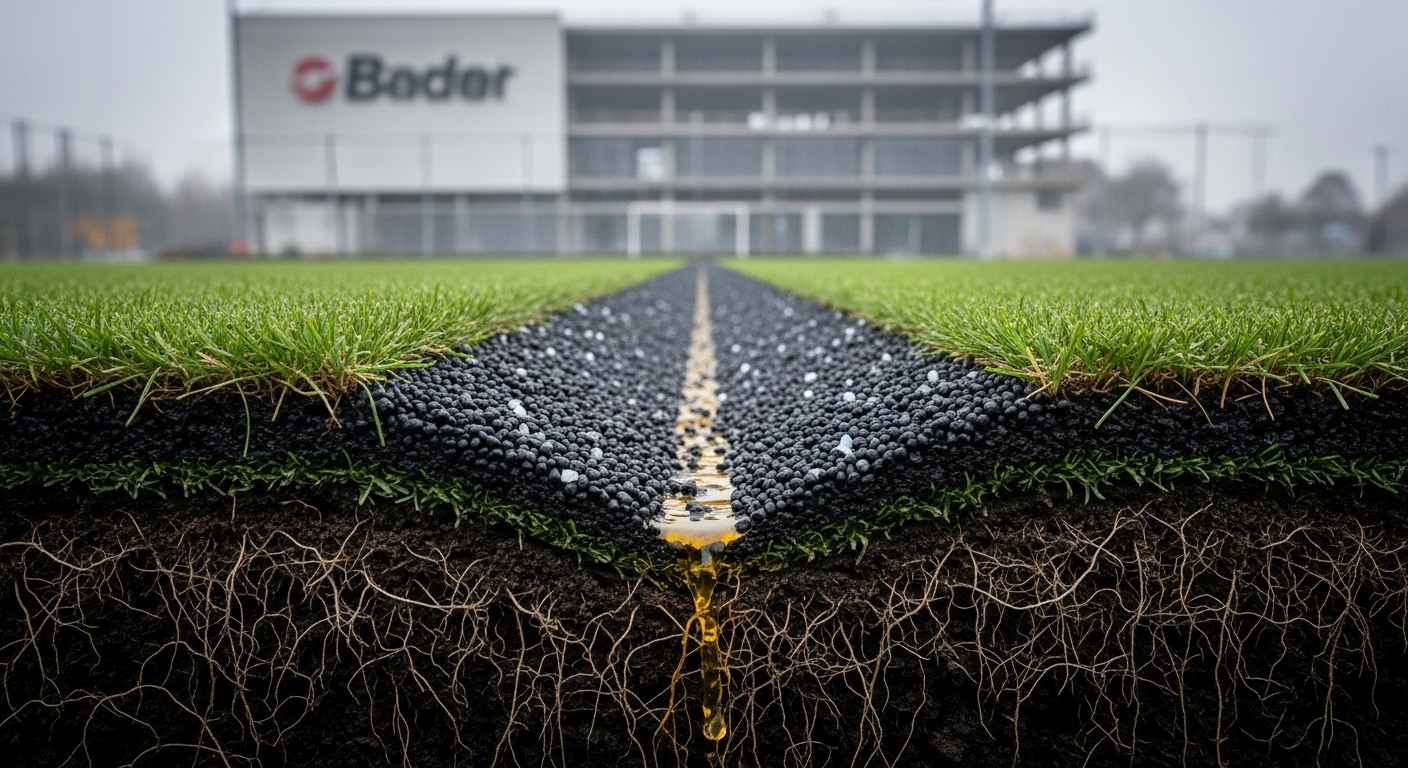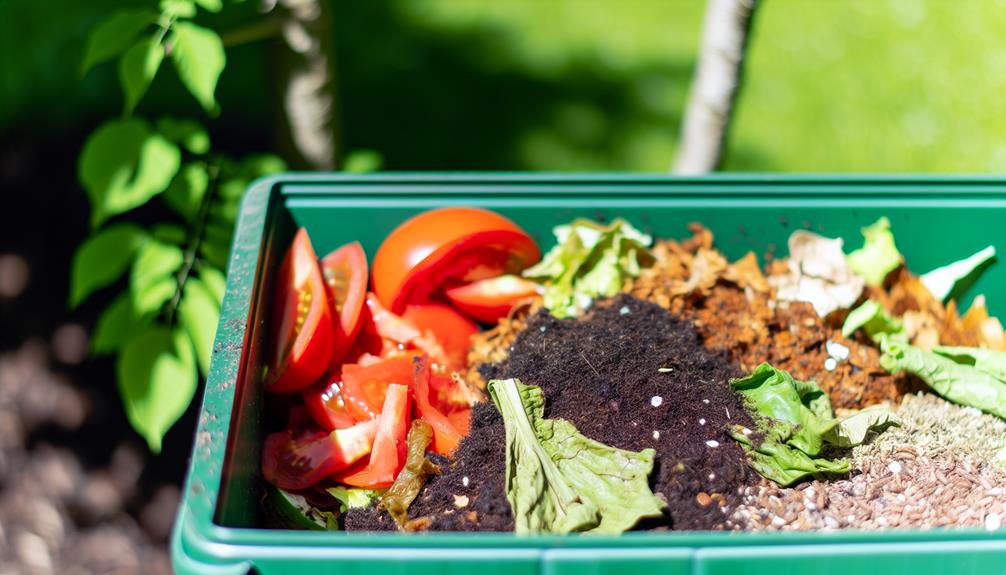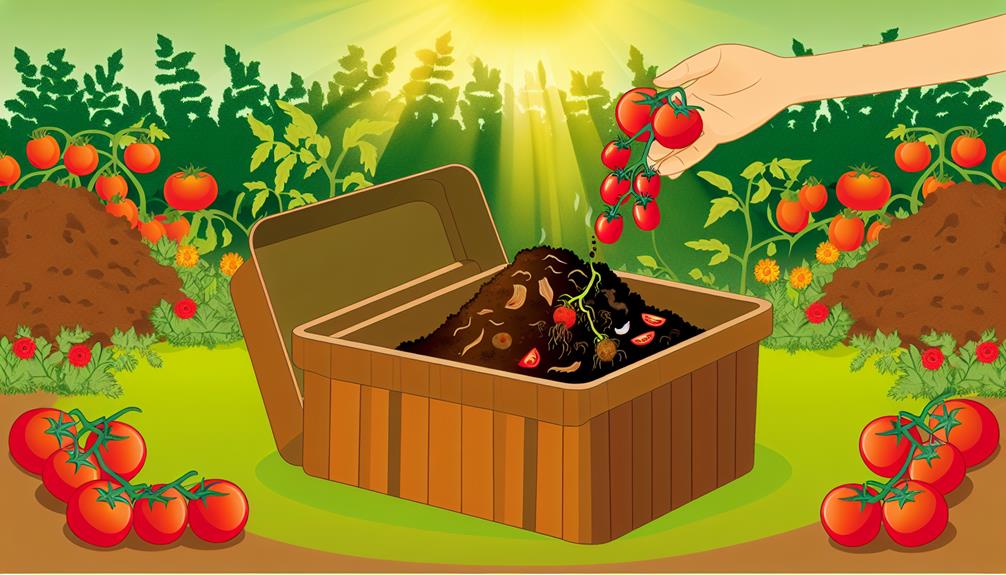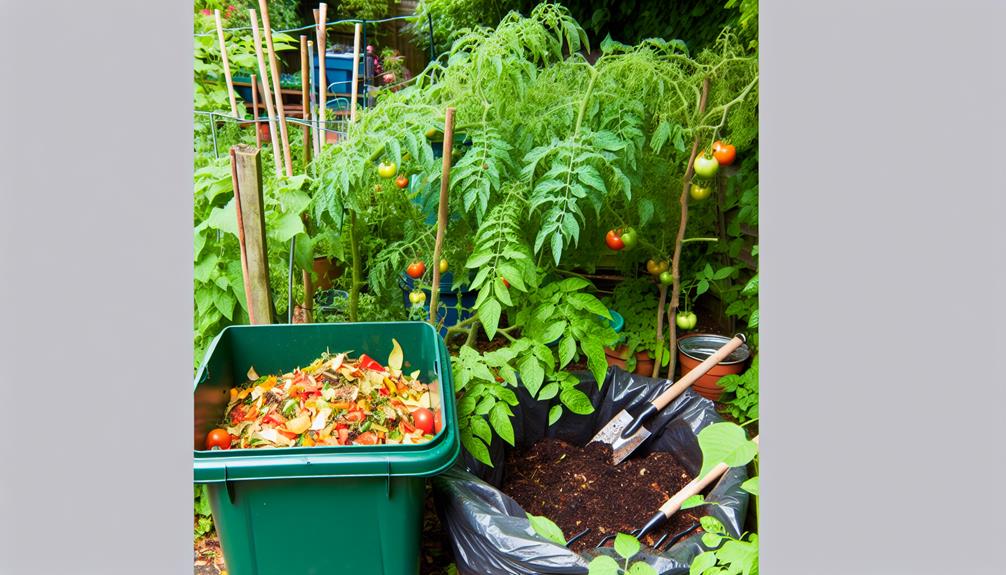

Yes, you can compost tomatoes. Chop them into smaller pieces to expedite decomposition and mix them with dry, carbon-rich materials like leaves or shredded paper. This helps maintain the balance of high water content in tomatoes. Regularly turn the compost pile for good aeration and monitor moisture levels to prevent it from becoming too wet.
Be cautious of potential issues such as disease transfer and seed germination. Maintaining a proper mix of green to brown materials guarantees efficient composting. With these steps, you’ll enrich your soil effectively. For detailed tips and troubleshooting common problems, keep exploring this topic.
Composting tomatoes offers several benefits, including enriching soil fertility and reducing kitchen waste. By composting tomatoes, you’re creating a nutrient-rich soil amendment that enhances the health of your garden. Tomatoes, like other kitchen scraps, break down into organic matter that boosts soil enrichment. This natural process increases the soil’s ability to retain moisture and nutrients, which, in turn, supports robust plant growth.
Additionally, composting tomatoes helps with waste reduction. Instead of throwing away tomato scraps, you’re diverting them from landfills and turning them into valuable compost. This practice not only minimizes your kitchen waste but also contributes to a greener environment by reducing methane emissions from decomposing food waste in landfills.
To start composting tomatoes, simply add them to your compost pile along with other kitchen scraps like vegetable peels and coffee grounds. Make sure you balance green materials (like tomatoes) with brown materials (like leaves or paper) to maintain a healthy compost mix. Turn the compost regularly to speed up decomposition.
Also Read: Can You Compost Branches?
While composting tomatoes offers numerous benefits, there are potential issues you should address to guarantee a healthy composting process. One major concern is disease transfer. Tomato plants can harbor diseases like blight or mosaic virus, which can survive the composting process if conditions aren’t hot enough. To prevent spreading these diseases to your garden, make sure your compost pile reaches a high internal temperature.
Another issue to take into account is seed germination. Tomato seeds are resilient and can survive the composting process, leading to unexpected seedlings sprouting in your compost. If they take root in your garden, they might compete with your planned crops. To minimize this, try crushing or chopping the tomatoes before adding them to the compost pile.
Additionally, balancing your compost is important. Tomatoes are high in water content, which can make your compost too wet and potentially smelly. Mix in dry, carbon-rich materials like leaves or straw to maintain a healthy balance.
Also Read: Can You Compost Bones?
To compost tomatoes effectively, start by chopping them into smaller pieces to speed up the decomposition process. This helps the microbes break down the material more quickly. Whether you’re dealing with heirloom or cherry tomato varieties, the method remains the same.

When engaging in indoor composting, follow these simple steps:
For indoor composting, use a compost bin that seals well to avoid odors. Tomatoes are rich in nitrogen, which is essential for your compost mix. Remember, not all tomato varieties decompose at the same rate, but the process remains generally uniform.
By following these steps, you’ll create nutrient-rich compost that benefits your garden.
Joining a community of composters can provide additional tips and support, fostering a sense of belonging as you contribute to a greener environment.
If you notice unpleasant odors or slow decomposition in your compost pile, there are a few common issues you can troubleshoot to get things back on track.
First, compost odor often indicates a lack of oxygen. Turn your pile regularly to aerate it and add dry materials like straw or leaves to balance the moisture levels.
Next, if compost pests like rodents or insects are a problem, it’s likely due to improper balance or exposed food scraps. Make sure your pile has a mix of green and brown materials, and always cover fresh food waste with a layer of soil or brown matter. This helps minimize odors and deter pests.
Slow decomposition usually stems from an imbalance in your compost mix. Check that you have an even ratio of nitrogen-rich greens (like tomato scraps) to carbon-rich browns. Chopping materials into smaller pieces can also speed up the process. Additionally, maintaining an appropriate moisture level—similar to a wrung-out sponge—is important for efficient breakdown.
Also Read: Can You Compost Body Wash?
For successful composting, make sure you maintain a balanced mix of green and brown materials. Green materials like tomato scraps provide nitrogen, while brown materials like dry leaves add carbon. This balance creates an ideal composting environment.

To get started, follow these tips:
Tomato preparation is key. Remove any stickers or ties from tomatoes before adding them to the compost. Including a mix of other kitchen scraps and yard waste will help maintain the right balance of nutrients. Remember, a well-maintained compost pile should smell earthy, not foul.
Yes, tomato seeds can sprout in the compost pile if germination conditions are right. You’ll often see them sprouting because seed dormancy breaks in the warm, moist environment. It’s a lovely surprise for gardeners!
Yes, tomatoes can attract pests to the compost pile. To deter them, use pest deterrents and promote compost aeration. By doing this, you’ll create a healthy compost environment and feel connected with fellow eco-conscious gardeners.
Tomatoes usually take a few months to decompose in compost. You’ll speed up the decomposition rate by maintaining proper moisture levels. Join our community of composters and share tips to create rich, healthy soil together!
You shouldn’t compost diseased tomatoes or rotten tomatoes. They can spread pathogens and attract pests to your compost pile. Stick to healthy, ripe tomatoes to make sure your compost stays beneficial and your garden thrives.
You can compost cooked tomatoes, but be mindful. They might impact nutrient retention and moisture balance. To guarantee a thriving compost community, mix them with dry materials like leaves or straw. Happy composting!
Composting tomatoes can enrich your garden soil. You need to manage potential issues like pests and disease. Chop the tomatoes before adding them to your compost pile for quicker decomposition.
Maintain a balanced mix of green and brown materials, and turn the pile regularly for aeration. Address common problems such as foul odors by adjusting moisture levels.
With these tips, you’ll compost tomatoes successfully and improve your compost quality.
